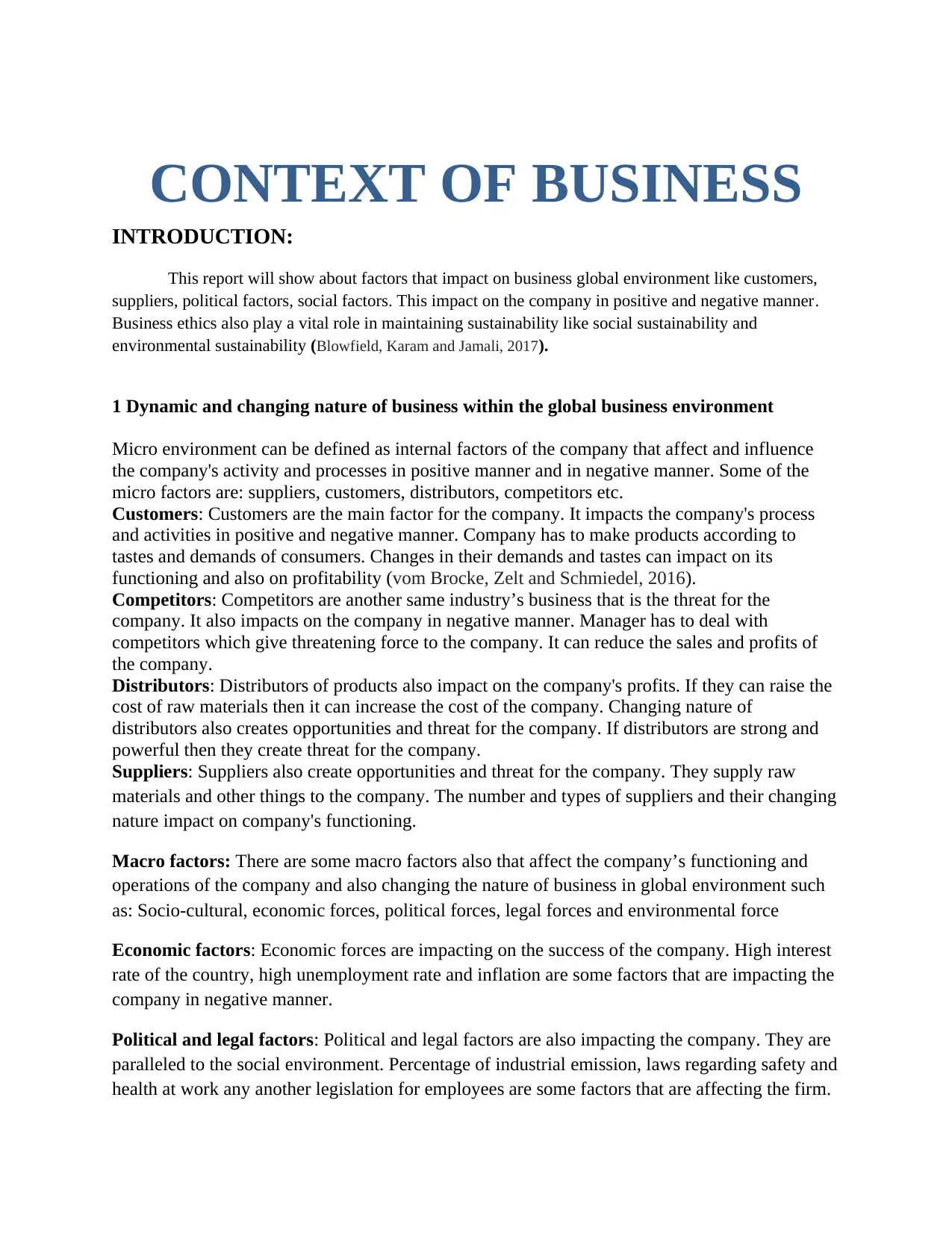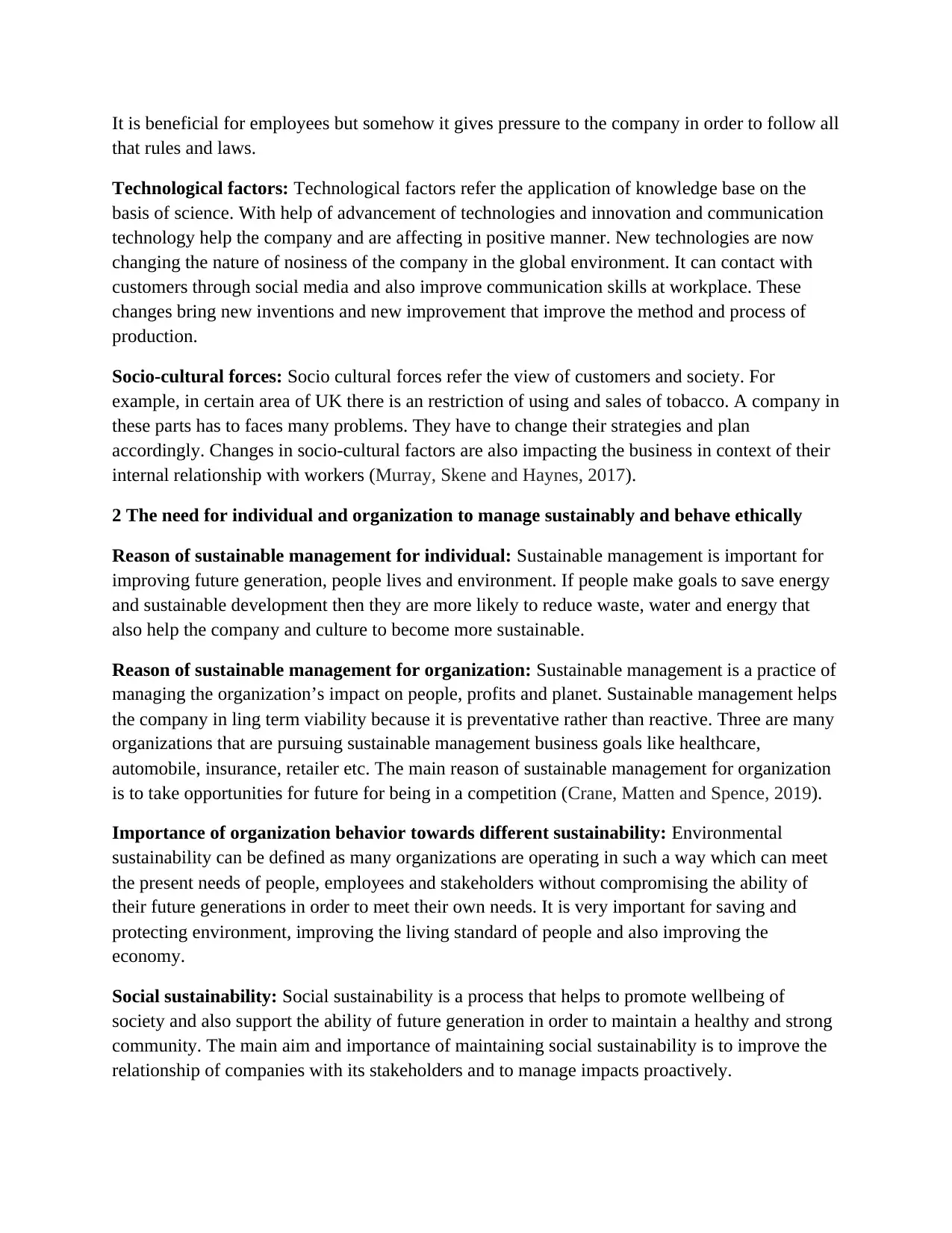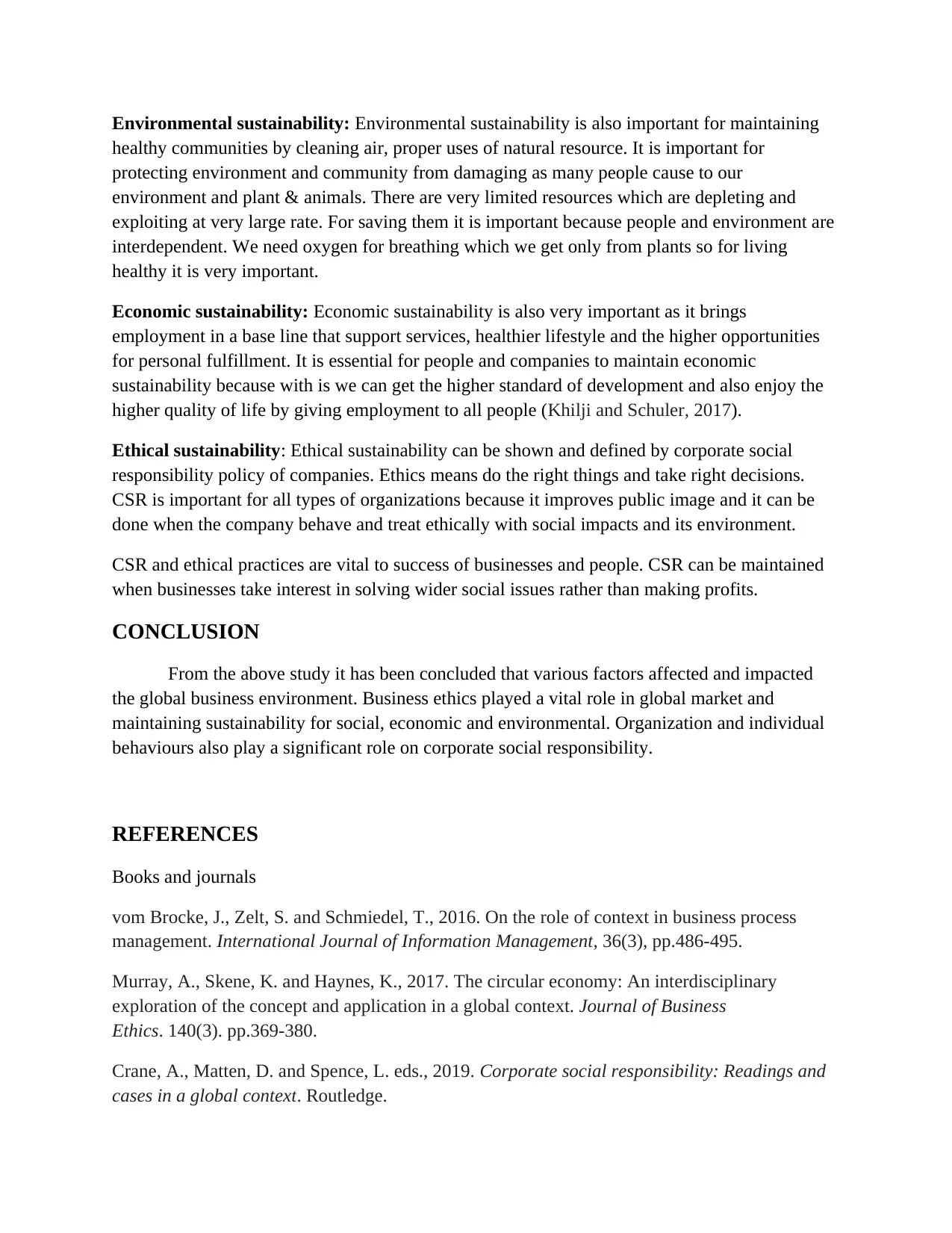Impact of Business Environment Factors: A Comprehensive Analysis
VerifiedAdded on 2021/01/02
|4
|1441
|57
Report
AI Summary
This report provides a comprehensive analysis of the factors impacting the global business environment. It explores both micro factors, such as customers, competitors, suppliers, and distributors, and macro factors, including economic, political, legal, technological, and socio-cultural forces. The report emphasizes the dynamic nature of the business environment and how these factors can affect a company's operations and profitability. Furthermore, it highlights the importance of sustainable management for both individuals and organizations, discussing environmental, social, economic, and ethical sustainability. The report concludes by emphasizing the vital role of business ethics in maintaining sustainability and corporate social responsibility in the global market. The report is supported by references to relevant academic literature.

CONTEXT OF BUSINESS
INTRODUCTION:
This report will show about factors that impact on business global environment like customers,
suppliers, political factors, social factors. This impact on the company in positive and negative manner.
Business ethics also play a vital role in maintaining sustainability like social sustainability and
environmental sustainability (Blowfield, Karam and Jamali, 2017).
1 Dynamic and changing nature of business within the global business environment
Micro environment can be defined as internal factors of the company that affect and influence
the company's activity and processes in positive manner and in negative manner. Some of the
micro factors are: suppliers, customers, distributors, competitors etc.
Customers: Customers are the main factor for the company. It impacts the company's process
and activities in positive and negative manner. Company has to make products according to
tastes and demands of consumers. Changes in their demands and tastes can impact on its
functioning and also on profitability (vom Brocke, Zelt and Schmiedel, 2016).
Competitors: Competitors are another same industry’s business that is the threat for the
company. It also impacts on the company in negative manner. Manager has to deal with
competitors which give threatening force to the company. It can reduce the sales and profits of
the company.
Distributors: Distributors of products also impact on the company's profits. If they can raise the
cost of raw materials then it can increase the cost of the company. Changing nature of
distributors also creates opportunities and threat for the company. If distributors are strong and
powerful then they create threat for the company.
Suppliers: Suppliers also create opportunities and threat for the company. They supply raw
materials and other things to the company. The number and types of suppliers and their changing
nature impact on company's functioning.
Macro factors: There are some macro factors also that affect the company’s functioning and
operations of the company and also changing the nature of business in global environment such
as: Socio-cultural, economic forces, political forces, legal forces and environmental force
Economic factors: Economic forces are impacting on the success of the company. High interest
rate of the country, high unemployment rate and inflation are some factors that are impacting the
company in negative manner.
Political and legal factors: Political and legal factors are also impacting the company. They are
paralleled to the social environment. Percentage of industrial emission, laws regarding safety and
health at work any another legislation for employees are some factors that are affecting the firm.
INTRODUCTION:
This report will show about factors that impact on business global environment like customers,
suppliers, political factors, social factors. This impact on the company in positive and negative manner.
Business ethics also play a vital role in maintaining sustainability like social sustainability and
environmental sustainability (Blowfield, Karam and Jamali, 2017).
1 Dynamic and changing nature of business within the global business environment
Micro environment can be defined as internal factors of the company that affect and influence
the company's activity and processes in positive manner and in negative manner. Some of the
micro factors are: suppliers, customers, distributors, competitors etc.
Customers: Customers are the main factor for the company. It impacts the company's process
and activities in positive and negative manner. Company has to make products according to
tastes and demands of consumers. Changes in their demands and tastes can impact on its
functioning and also on profitability (vom Brocke, Zelt and Schmiedel, 2016).
Competitors: Competitors are another same industry’s business that is the threat for the
company. It also impacts on the company in negative manner. Manager has to deal with
competitors which give threatening force to the company. It can reduce the sales and profits of
the company.
Distributors: Distributors of products also impact on the company's profits. If they can raise the
cost of raw materials then it can increase the cost of the company. Changing nature of
distributors also creates opportunities and threat for the company. If distributors are strong and
powerful then they create threat for the company.
Suppliers: Suppliers also create opportunities and threat for the company. They supply raw
materials and other things to the company. The number and types of suppliers and their changing
nature impact on company's functioning.
Macro factors: There are some macro factors also that affect the company’s functioning and
operations of the company and also changing the nature of business in global environment such
as: Socio-cultural, economic forces, political forces, legal forces and environmental force
Economic factors: Economic forces are impacting on the success of the company. High interest
rate of the country, high unemployment rate and inflation are some factors that are impacting the
company in negative manner.
Political and legal factors: Political and legal factors are also impacting the company. They are
paralleled to the social environment. Percentage of industrial emission, laws regarding safety and
health at work any another legislation for employees are some factors that are affecting the firm.
Paraphrase This Document
Need a fresh take? Get an instant paraphrase of this document with our AI Paraphraser

It is beneficial for employees but somehow it gives pressure to the company in order to follow all
that rules and laws.
Technological factors: Technological factors refer the application of knowledge base on the
basis of science. With help of advancement of technologies and innovation and communication
technology help the company and are affecting in positive manner. New technologies are now
changing the nature of nosiness of the company in the global environment. It can contact with
customers through social media and also improve communication skills at workplace. These
changes bring new inventions and new improvement that improve the method and process of
production.
Socio-cultural forces: Socio cultural forces refer the view of customers and society. For
example, in certain area of UK there is an restriction of using and sales of tobacco. A company in
these parts has to faces many problems. They have to change their strategies and plan
accordingly. Changes in socio-cultural factors are also impacting the business in context of their
internal relationship with workers (Murray, Skene and Haynes, 2017).
2 The need for individual and organization to manage sustainably and behave ethically
Reason of sustainable management for individual: Sustainable management is important for
improving future generation, people lives and environment. If people make goals to save energy
and sustainable development then they are more likely to reduce waste, water and energy that
also help the company and culture to become more sustainable.
Reason of sustainable management for organization: Sustainable management is a practice of
managing the organization’s impact on people, profits and planet. Sustainable management helps
the company in ling term viability because it is preventative rather than reactive. Three are many
organizations that are pursuing sustainable management business goals like healthcare,
automobile, insurance, retailer etc. The main reason of sustainable management for organization
is to take opportunities for future for being in a competition (Crane, Matten and Spence, 2019).
Importance of organization behavior towards different sustainability: Environmental
sustainability can be defined as many organizations are operating in such a way which can meet
the present needs of people, employees and stakeholders without compromising the ability of
their future generations in order to meet their own needs. It is very important for saving and
protecting environment, improving the living standard of people and also improving the
economy.
Social sustainability: Social sustainability is a process that helps to promote wellbeing of
society and also support the ability of future generation in order to maintain a healthy and strong
community. The main aim and importance of maintaining social sustainability is to improve the
relationship of companies with its stakeholders and to manage impacts proactively.
that rules and laws.
Technological factors: Technological factors refer the application of knowledge base on the
basis of science. With help of advancement of technologies and innovation and communication
technology help the company and are affecting in positive manner. New technologies are now
changing the nature of nosiness of the company in the global environment. It can contact with
customers through social media and also improve communication skills at workplace. These
changes bring new inventions and new improvement that improve the method and process of
production.
Socio-cultural forces: Socio cultural forces refer the view of customers and society. For
example, in certain area of UK there is an restriction of using and sales of tobacco. A company in
these parts has to faces many problems. They have to change their strategies and plan
accordingly. Changes in socio-cultural factors are also impacting the business in context of their
internal relationship with workers (Murray, Skene and Haynes, 2017).
2 The need for individual and organization to manage sustainably and behave ethically
Reason of sustainable management for individual: Sustainable management is important for
improving future generation, people lives and environment. If people make goals to save energy
and sustainable development then they are more likely to reduce waste, water and energy that
also help the company and culture to become more sustainable.
Reason of sustainable management for organization: Sustainable management is a practice of
managing the organization’s impact on people, profits and planet. Sustainable management helps
the company in ling term viability because it is preventative rather than reactive. Three are many
organizations that are pursuing sustainable management business goals like healthcare,
automobile, insurance, retailer etc. The main reason of sustainable management for organization
is to take opportunities for future for being in a competition (Crane, Matten and Spence, 2019).
Importance of organization behavior towards different sustainability: Environmental
sustainability can be defined as many organizations are operating in such a way which can meet
the present needs of people, employees and stakeholders without compromising the ability of
their future generations in order to meet their own needs. It is very important for saving and
protecting environment, improving the living standard of people and also improving the
economy.
Social sustainability: Social sustainability is a process that helps to promote wellbeing of
society and also support the ability of future generation in order to maintain a healthy and strong
community. The main aim and importance of maintaining social sustainability is to improve the
relationship of companies with its stakeholders and to manage impacts proactively.

Environmental sustainability: Environmental sustainability is also important for maintaining
healthy communities by cleaning air, proper uses of natural resource. It is important for
protecting environment and community from damaging as many people cause to our
environment and plant & animals. There are very limited resources which are depleting and
exploiting at very large rate. For saving them it is important because people and environment are
interdependent. We need oxygen for breathing which we get only from plants so for living
healthy it is very important.
Economic sustainability: Economic sustainability is also very important as it brings
employment in a base line that support services, healthier lifestyle and the higher opportunities
for personal fulfillment. It is essential for people and companies to maintain economic
sustainability because with is we can get the higher standard of development and also enjoy the
higher quality of life by giving employment to all people (Khilji and Schuler, 2017).
Ethical sustainability: Ethical sustainability can be shown and defined by corporate social
responsibility policy of companies. Ethics means do the right things and take right decisions.
CSR is important for all types of organizations because it improves public image and it can be
done when the company behave and treat ethically with social impacts and its environment.
CSR and ethical practices are vital to success of businesses and people. CSR can be maintained
when businesses take interest in solving wider social issues rather than making profits.
CONCLUSION
From the above study it has been concluded that various factors affected and impacted
the global business environment. Business ethics played a vital role in global market and
maintaining sustainability for social, economic and environmental. Organization and individual
behaviours also play a significant role on corporate social responsibility.
REFERENCES
Books and journals
vom Brocke, J., Zelt, S. and Schmiedel, T., 2016. On the role of context in business process
management. International Journal of Information Management, 36(3), pp.486-495.
Murray, A., Skene, K. and Haynes, K., 2017. The circular economy: An interdisciplinary
exploration of the concept and application in a global context. Journal of Business
Ethics. 140(3). pp.369-380.
Crane, A., Matten, D. and Spence, L. eds., 2019. Corporate social responsibility: Readings and
cases in a global context. Routledge.
healthy communities by cleaning air, proper uses of natural resource. It is important for
protecting environment and community from damaging as many people cause to our
environment and plant & animals. There are very limited resources which are depleting and
exploiting at very large rate. For saving them it is important because people and environment are
interdependent. We need oxygen for breathing which we get only from plants so for living
healthy it is very important.
Economic sustainability: Economic sustainability is also very important as it brings
employment in a base line that support services, healthier lifestyle and the higher opportunities
for personal fulfillment. It is essential for people and companies to maintain economic
sustainability because with is we can get the higher standard of development and also enjoy the
higher quality of life by giving employment to all people (Khilji and Schuler, 2017).
Ethical sustainability: Ethical sustainability can be shown and defined by corporate social
responsibility policy of companies. Ethics means do the right things and take right decisions.
CSR is important for all types of organizations because it improves public image and it can be
done when the company behave and treat ethically with social impacts and its environment.
CSR and ethical practices are vital to success of businesses and people. CSR can be maintained
when businesses take interest in solving wider social issues rather than making profits.
CONCLUSION
From the above study it has been concluded that various factors affected and impacted
the global business environment. Business ethics played a vital role in global market and
maintaining sustainability for social, economic and environmental. Organization and individual
behaviours also play a significant role on corporate social responsibility.
REFERENCES
Books and journals
vom Brocke, J., Zelt, S. and Schmiedel, T., 2016. On the role of context in business process
management. International Journal of Information Management, 36(3), pp.486-495.
Murray, A., Skene, K. and Haynes, K., 2017. The circular economy: An interdisciplinary
exploration of the concept and application in a global context. Journal of Business
Ethics. 140(3). pp.369-380.
Crane, A., Matten, D. and Spence, L. eds., 2019. Corporate social responsibility: Readings and
cases in a global context. Routledge.
⊘ This is a preview!⊘
Do you want full access?
Subscribe today to unlock all pages.

Trusted by 1+ million students worldwide

Khilji, S.E. and Schuler, R.S., 2017. Talent management in the global context. The Oxford
Handbook of Talent Management. p.399.
Blowfield, M., Karam, C. and Jamali, D. eds., 2017. Development-Oriented Corporate Social Responsibility:
Volume 1: Multinational Corporations and the Global Context. Routledge.
Handbook of Talent Management. p.399.
Blowfield, M., Karam, C. and Jamali, D. eds., 2017. Development-Oriented Corporate Social Responsibility:
Volume 1: Multinational Corporations and the Global Context. Routledge.
1 out of 4
Related Documents
Your All-in-One AI-Powered Toolkit for Academic Success.
+13062052269
info@desklib.com
Available 24*7 on WhatsApp / Email
![[object Object]](/_next/static/media/star-bottom.7253800d.svg)
Unlock your academic potential
Copyright © 2020–2026 A2Z Services. All Rights Reserved. Developed and managed by ZUCOL.





